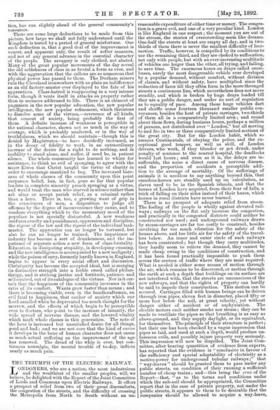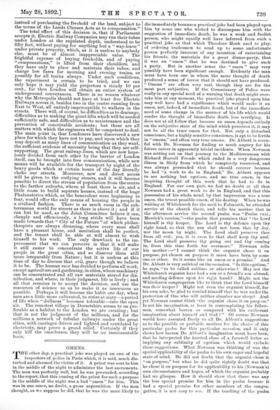THE TRIUMPH OF THE ELECTRIC RAILWAY. L ONDONERS, who are a
nation, the most industrious and the wealthiest of the smaller peoples, will, we believe, be delighted with the Report of the Joint Committee a Lords and Commons upon Electric Railways. It offers a prospect of relief from two of their - great discomforts, the congestion of the streets, and the difficulty of crossing the Metropolis from North to South without an un- reasonable expenditure of either time or money. The conges- tion is a grave evil, and one of a very peculiar kind. London is like England in one respect ; the moment you are out of the stream, the stories of overcrowding seem like dreams. One-half the streets at least are empty all day, and in two- thirds of them there is never the smallest difficulty of loco- motion. Traffic, however, is compelled by its conditions to use the remaining third, and they are choked to suffocation, not only with people, but with an ever-increasing multitude of vehicles one huger than the other, all trying, and failing, to save time. The enormous boxes on drays called omni- buses, surely the most disagreeable vehicle ever developed by a popular demand, without comfort, without division of classes, and without safety, have multiplied since the reduction of fares till they often form in the more thronged streets a continuous line, which nevertheless does not move steadily, and which is broken by huge drays loaded till they are a public danger, and under no sort of regulation as to equality of pace. Among these huge vehicles dart and shuffle some fourteen thousand smaller public con- veyances, besides the host of private carriages, two-thirds of them all in a comparatively limited area ; and round about them flows, during business hours, perhaps a million of persons, not distributed over " London, ' but all moving to and fro in two or three comparatively limited sections of the great city. But for the London habit, which so amazes Continentals, of obeying the police, and the ex- ceptional good temper, as well as skill, of London drivers, who work, if they blunder or get drunk, under penalty of sentence to the nearest hospital, the deadlocks would last hours ; and even as it is, the delays are in- sufferable, the noise a direct cause of nervous disease, and the proportion of accidents a perceptible addi- tion to the average of mortality. Of the sufferings of animals it is needless to say anything beyond this, that omnibus-horses are steadily used up on calculation, as slaves used to be in the Spanish islands, and that the horses of London have acquired, from their fear of falls, a trick of falling on their sides instead of their knees, which horses in rural districts have never learned.
There is no prospect of adequate relief from steam. The feeling of the people is wholly against elevated rail- ways ; railways on the flat only increase the congestion, and practically in the congested districts could neither be constructed nor used ; and underground railways drawn by steam-carriages are far too costly to construct, besides involving far too much vibration for the safety of the houses above, and too little air for the safety of the travel- lers below. An inner and outer circle of such railways has been constructed ; but though they carry multitudes, they hardly seem to relieve the demand, they cannot be made cheap owing to the conditions of construction, and it has been found practically impossible to push them across the centres of traffic where they are most required. What is needed is either some means of motion through the air, which remains to be discovered, or motion through the earth at such a depth that buildings on its surface are not interfered with, that the streets are unconscious of the new subways, and that the rights of property can hardly be said to impede their construction. This motion can be secured. Carriages filled with human beings can be driven through iron pipes, eleven feet in diameter, placed fifty or more feet below the soil, at great velocity, yet without danger either of accident or of asphyxiation. The electric motors emit neither smoke nor steam ; they can be made to ventilate the pipes so that breathing is as easy as above-ground, and they supply daylight, or its equivalent, for themselves. The principle of their structure is perfect ; but their use has been checked by a vague impression that pipes so laid, and used at such a depth, would produce un- foreseen evils, and possibly injure property very seriously. This impression will now be dispelled. The Joint Com- mittee, after hearing quantities of evidence from experts, has reported that the evidence is 'conclusive in favour of the sufficiency and special adaptability of electricity as a motive-power for underground tubular railways ;" that " way-leaves" should be granted them to pass under any public streets, on condition of their running a sufficient number of cheap trains ; and—this being the crux of the Report—that, "as to the terms and conditions under which the sub-soil should be appropriated, the Committee report that in the case of private property, not under the public streets, it appears to them to be desirable that the companies should be allowed to acquire a way-leave, instead of purchasing the freehold of the land, subject to the terms of the Lands Clauses Acts as to compensation." The total effect of this decision is, that if Parliament accepts it., Electric Railway Companies may run their tubes under London at the regulated depth, understood to be fifty feet, without paying for anything but a "way-leave" under private property, which, as it is useless to anybody else, must be of almost inappreciable value. The frightful expense of buying freeholds, and of paying "compensations," is lifted from their shoulders, and they have only to place and maintain their tubes, and charge low fares for morning and evening trains, or possibly for all trains always. Under such conditions, the experiment is certain to be tried, and we can only hope it may yield the projectors a steady 10 per cent., for then London will obtain an entire system of underground conveyances. There is no reason whatever why the Metropolis should not have at least five Electric Railways across it, besides two in the centre running from East to West, all entirely imperceptible to walkers in the streets. There will, of course, be difficulties as to drainage, difficulties as to making the giant lifts which will be needed sufficiently safe, and difficulties as to maintenance and the prevention of conceivable accidents ; but these are all matters with which the engineers will be competent to deal. The main point is, that Londoners have discovered a new place for which they have not to pay, and upon which they may deposit as many lines of communication as they want, the sufficient evidence of necessity being that they are self- supporting. The great railway-lines, which are now hope- lessly divided from each other by the barrier of London itself, can be brought into free communication, while new means will be available for the transport by night of the heavy goods which at certain hours of the day literally choke our streets. Moreover, new and direct access will be given to the outlying streets, and it will become possible to direct the stream of population from the centre to the farther suburbs, where at least there is air, and a little room to build separate houses, instead of the huge Phalansteries which, as the benevolent were beginning to fear, would offer the only means of housing the people in a civilised fashion. There is as much room in the sub- terranean world for streets as there is above it ; and if it can but be used, as the Joint Committee believe it can, cheaply and efficaciously, a long stride will have been made towards that "City of the Future " of which philan- thropists are always dreaming, where every man shall have a pleasant house, and sanitation shall be perfect, and the tenant shall be able at will almost to wish himself to his work. The only drawback to the im- provement that we can perceive is that it will make it still easier to concentrate the active life of our people in the great cities, and so dissever them still more irreparably from Nature ; but it is useless at this time of day to discuss that evil, grave though we believe it to be. The human race has decided to perform all work, except agriculture and gardening, in cities, where machinery can be concentrated and all raw materials stored for dis- tribution, and where, in their judgment, life is lively ; and all that remains is to accept the decision, and use the resources of science so as to make it as innocuous as possible. Perhaps it will become the habit one day, when men are a little more cultivated, to retire at sixty—a period of life when " dullness " becomes tolerable—into the open air. The remotest village in Dorsetshire seems to us pre- ferable as a habitat to the London we are creating ; but that is not the judgment of the millions, and for the millions a network of tubular railways under the great cities, with carriages driven and lighted and ventilated by electricity, may prove a grand relief. Certainly if they only kill the omnibuses, they will be an immeasurable boon.







































 Previous page
Previous page